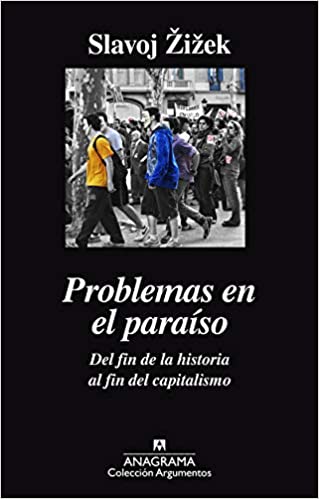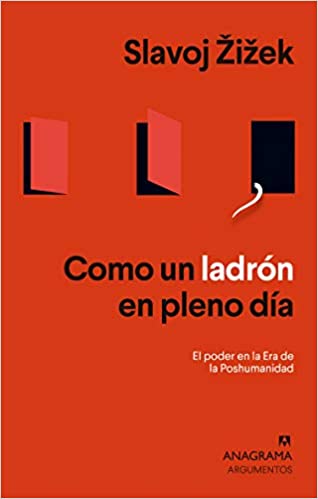Many are the candidates but few are the chosen ones. In the more pragmatic philosophy of our days guys like Zizek o Noam Chomsky They become those references that everyone pays attention to and everyone cites. It is a matter of extended merits. And also a question of capacity, more than synthesis, of clairvoyance for a world torpedoed by segmented information and interested knowledge.
In the past, philosophers put the first lights in a dark world. Today thinkers have a much more complex task. Because reaching the maximum extreme of wisdom, from knowledge and information, we cross to the other side of the opposite pole to be left with misinformation, newspeak and reality made into a selective truth to the taste of the consumer.
There is no one who trusts almost anything in terms of ideologies, thoughts or ethics of our days. That is why Zizek in this case invites us to immerse ourselves in a critical vision from the ideologues of the XNUMXth century backwards. The XNUMXst century can be considered lost in its most ideological notion. Thus, only philosophy worked on in other times and current literature presented by still lucid and furiously critical minds that are as necessary as prozac to keep reason in its place remain.
Top 3 books recommended by Slavoj Zizek
Trouble in paradise. From the end of history to the end of capitalism
The "paradise" of the title is the democratic and liberal capitalism that for decades has been sold to us as the best possible social order, and the "problems" are, naturally, the chains of that ghost that, for lack of a better name, since Years ago we called the economic crisis. Slavoj Zizek comes to our aid with his new work, where, with his lucid style and his inimitable mix of scholarship and popular culture, he offers us an accurate diagnosis of this social and political moment that condemns citizens to an increasingly passive role. and powerless.
Starting from the homonymous film by Ernst Lubitsch, Zizek offers us an analysis in five large sections: a diagnosis of the basic coordinates of the capitalist system, taking as an example the tremendous cultural shock that occurred in South Korea with the irruption of the digital world; a cardiognosis, a "knowledge of the heart" of the system from three characters who have delved into its darkest corners: Julian Assange, the soldier Chelsea Manning and Edward Snowden; a prognosis, in which he proposes to reject that false dichotomy between liberal capitalism and religious fundamentalism (which he portrays as two sides of the same coin); and an epignosis, where he proposes new organizational forms with which to combat these "creative" finances that have turned the economy into a gigantic casino in which not everyone can play.
The book closes with an appendix in which Zizek addresses the recent emancipatory struggles (the Arab Spring, Greece, Ukraine) as a revolt against the New World Order.
Zizek, who with his intellectual promiscuity has taught us to understand Freud or Nietzsche by reading them through the lens of Jaws or Mary Poppins, now invites us to reflect on our most immediate crisis through Lubitsch and Hegel, Batman and Lacan , by Chesterton and Kant, in a book where pleasantness is not at odds with depth, nor militancy with irony, and where the forcefulness of his voice prevails over the neoliberal and politically correct discourses that seek to bury us with their verbiage.
Like a thief in broad daylight
Žižek raises one of the key questions of our time: what should be the role of philosophy in addressing contemporary problems? And more specifically: what type of philosophers do we need, those who "corrupt" youth and make them think - like Socrates - or "normalizers" - like Aristotle -, who try to reconcile philosophy with the established order?
According to Žižek, philosophy must combat the growing nihilistic order that they want to sell to us as the domain of new freedoms, this worldless civilization that obviously affects young people. Faced with the alternatives of populism or religious fundamentalism, Žižek proposes the construction of new emancipatory zones, starting with the cities – among which he gives Barcelona as an example – the rupture of patriarchal domination, the vindication of materialism and the invention of a new society that corrects the errors of capitalism and communism.
More combative and lucid than ever, Žižek alerts us to the siren songs of the agony of capitalism, which in its latest ideological evolution offers us a false freedom in exchange for our absolute submission, in this "post-human" era in which we can only recover our individuality carrying out an emancipatory and egalitarian social evolution.
Pandemic: Covid-19 shakes the world
An urgent reflection on the coronavirus crisis. On its relationship with politics, the economy, fear and freedoms. On the connection between the spread of the pandemic and the socioeconomic model of modern societies. On COVID-19 as the last warning in the face of the ecological crisis that is looming over the future of the world.
About the need not to remain in the mere naive reflection on how this crisis teaches us what is truly essential in our daily lives, but to go further and think about what form of social organization will replace the liberal-capitalist New World Order. How is the pandemic going to change not just our lives but the entire society? The author will allocate all worldwide royalties from this book to the NGO Doctors Without Borders.



